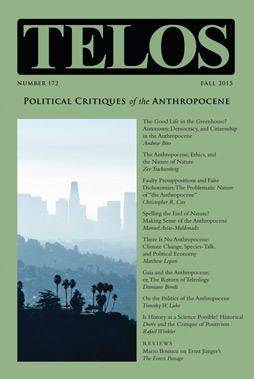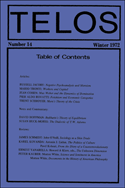 Critiques of the Anthropocene abound, but few adequately challenge the argument’s historical weaknesses. This essay is meant to engage them. The Anthropocene argument relies deeply upon the false dichotomy that human reality is not geological reality; that individual and collective human behaviors are of more importance than the systems in which those behaviors are manifested. The violent ontological notion that humans are extra-natural and nature is extra-human, the human/nature divide, set the stage long ago for the systemic exploitation and appropriation of nature. Unlimited accumulation of capital is a holographic-like reality, only plausible if humans are seen as the beneficiaries of nature’s “bounty,” and extra-human nature as the beneficiary of humanity’s waste. My argument unfolds in three pieces: First, these problematic ontologies are laid out and retreated with historical relationality. Second, I utilize some key theses from the work of Jason W. Moore to take seriously the notion that “nature” is not in fact ontologically divided from the human, but is always already co-constitutive of both the human and the extra-human. This framing allows us to see that carbon intensive social engines are only possible under specific organizational regimes of power. Capital, not the Anthropos, is at the heart of what the Anthropocene is most concerned about, carbon, and therefore the Anthropocene is a misnomer. It is in this sense that I argue, in solidarity with Moore and others, that this new epoch we have entered is more aptly called the Capitalocene.
Critiques of the Anthropocene abound, but few adequately challenge the argument’s historical weaknesses. This essay is meant to engage them. The Anthropocene argument relies deeply upon the false dichotomy that human reality is not geological reality; that individual and collective human behaviors are of more importance than the systems in which those behaviors are manifested. The violent ontological notion that humans are extra-natural and nature is extra-human, the human/nature divide, set the stage long ago for the systemic exploitation and appropriation of nature. Unlimited accumulation of capital is a holographic-like reality, only plausible if humans are seen as the beneficiaries of nature’s “bounty,” and extra-human nature as the beneficiary of humanity’s waste. My argument unfolds in three pieces: First, these problematic ontologies are laid out and retreated with historical relationality. Second, I utilize some key theses from the work of Jason W. Moore to take seriously the notion that “nature” is not in fact ontologically divided from the human, but is always already co-constitutive of both the human and the extra-human. This framing allows us to see that carbon intensive social engines are only possible under specific organizational regimes of power. Capital, not the Anthropos, is at the heart of what the Anthropocene is most concerned about, carbon, and therefore the Anthropocene is a misnomer. It is in this sense that I argue, in solidarity with Moore and others, that this new epoch we have entered is more aptly called the Capitalocene.
|
|
||||
|
Telos Press Publishing · PO Box 811 · Candor, NY 13743 · Phone: 212-228-6479 Privacy Policy · Data Protection Copyright © 2024 Telos Press Publishing · All Rights Reserved |
||||
 Mario Tronti’s postscript to the second edition of his publication Operai e Capitale, published in Telos in 1972 as “Workers and Capital,” provides the reader with a summation of his thought on the development of the “mass worker,” presented through an analysis of notable labor struggles across the Western world. Tronti’s methodology, which he briefly explicates at the beginning of the piece, delineates certain historical workers’ struggles in order to examine “macroscopic groups of facts yet untouched by the critical consciousness of labor thought” (25). His purpose is to yield “an historical model, a privileged period of research” (25) so as to better analyze the emergence of the autonomy of the working class engaged in a dialectical struggle with capital.
Mario Tronti’s postscript to the second edition of his publication Operai e Capitale, published in Telos in 1972 as “Workers and Capital,” provides the reader with a summation of his thought on the development of the “mass worker,” presented through an analysis of notable labor struggles across the Western world. Tronti’s methodology, which he briefly explicates at the beginning of the piece, delineates certain historical workers’ struggles in order to examine “macroscopic groups of facts yet untouched by the critical consciousness of labor thought” (25). His purpose is to yield “an historical model, a privileged period of research” (25) so as to better analyze the emergence of the autonomy of the working class engaged in a dialectical struggle with capital. 






